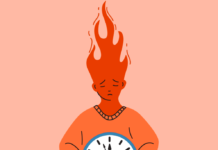From The British Psychological Society: “Burnout rates were higher in psychologists who were less experienced, and also in those with less subjective confidence in their professional ability. Several studies showed a lack of social support in or outside the workplace was associated with burnout. However, other studies showed that frequent discussion of work frustration with others was itself associated with higher burnout. This could simply be because therapists on the brink of overload are more likely to vent. Alternatively, there could be a reverse causality – other research has suggested venting can impede recovery from stressful situations.
…
Based on their findings, Simionato and Simpson make some specific recommendations for ways of approaching work that may be useful: maintaining boundaries, seeking support, staying in touch with humour. There is also some general evidence that mindfulness may be an effective route to reducing rumination and unrealistic expectations. Supervisors should consider that therapists who muster confidence in their abilities are likely to ward off emotional overload, and therefore ensure that their charges’ successes are recognised and their struggles put in context. The likely influence of personality factors reinforces the need for people to be holistically suited to the particular challenges of a job role. A therapist seeking to work in a highly challenging position, due to the nature of clients or the operating environment, should be both technically qualified and temperamentally suited, or else they may pay the price over time.”















